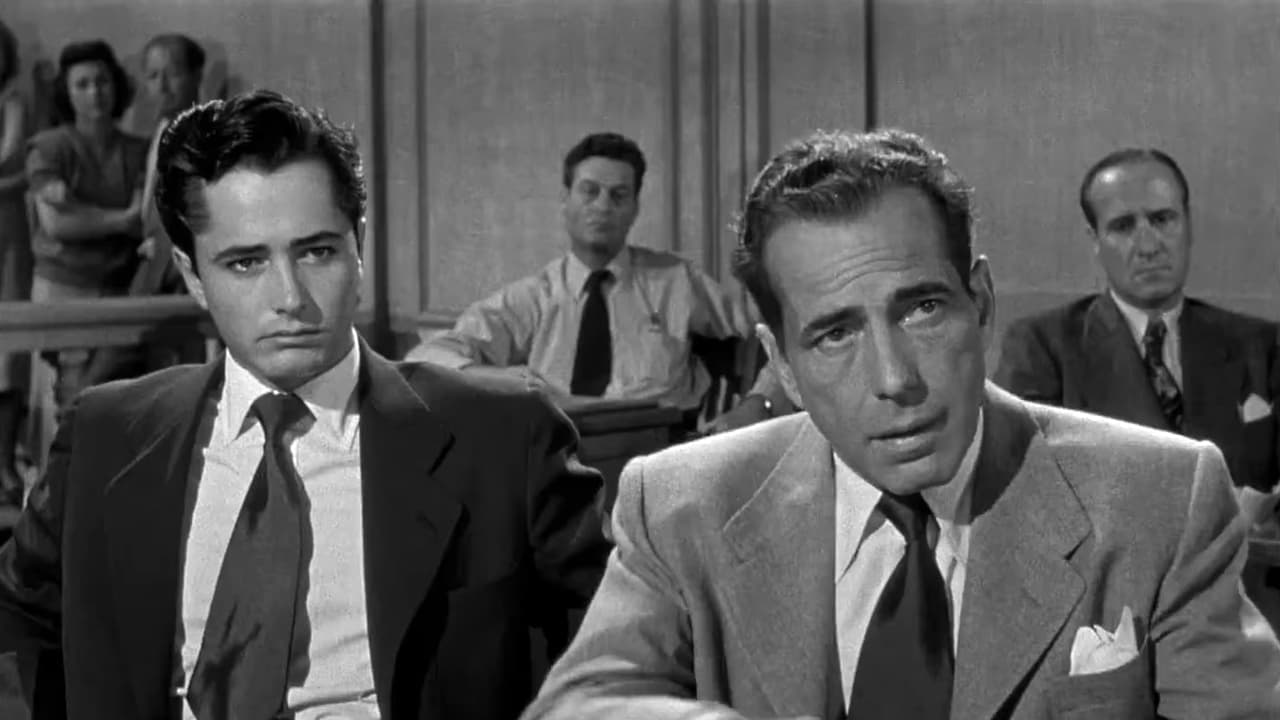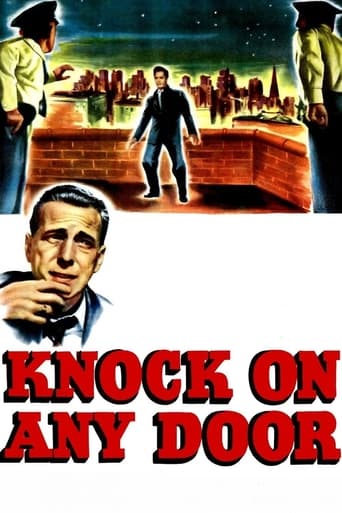Huievest
Instead, you get a movie that's enjoyable enough, but leaves you feeling like it could have been much, much more.
TaryBiggBall
It was OK. I don't see why everyone loves it so much. It wasn't very smart or deep or well-directed.
Aneesa Wardle
The story, direction, characters, and writing/dialogue is akin to taking a tranquilizer shot to the neck, but everything else was so well done.
Brennan Camacho
Mostly, the movie is committed to the value of a good time.
JohnHowardReid
Humphrey Bogart's initial offering as an executive producer for his Santana Production company, suffers from a long flashback sequence in which Bogart disappears while John Derek does all the running. Most of this flashback is both clichéd and dull. Fortunately, Bogie's scenes are not only more suspenseful script-wise, but are enlivened by the actor's usual charisma. Admittedly, John Derek does a reasonable job, but only Bogie and George Macready can handle the sometimes preachy screenplay with both charisma and authority. True, Cara Williams, Jimmy Conlin, Houseley Stevenson and Vince Barnett handle their lesser roles with similar conviction, but they are not required to step out of character. Despite the script's faults, it does provide some heart-stopping action both in and out of the courtroom. Nicholas Ray's driving direction and Burnett Guffey's superbly noirish photography also contribute. This film is now available as a Columbia DVD.
bobsgrock
Humphrey Bogart's first film away from the controlled environment of Warner Brothers shows its technical flaws, particularly in the script which consists of scene after scene of relentless polemical exposition detailing the supposed evidence for why society has just as much a blame as the criminals living in the slums produced by them. This is not a new message from the movies and after World War II, the intent to clean up the streets of America became much more of a signature statement for the left-leaning political crowd as a way to counter the focus on international affairs. Bogart and director Nicholas Ray were certainly huge figures in that movement but Bogie's first time as producer and Ray's second feature film leave much to be desired. Most of the performances are either too stiff or too exaggerated. Only Bogie manages to maintain a collected and understated performance despite his unnecessary preaching at the end. Perhaps no other actor in history portrays hard-edged cynicism better than Bogart, which makes it all the more surprising that his character remains this way for much of the film only to jump on society in the final scene. Ray's direction is nothing too special as he was still feeling his way around a movie set. He does, however, exhibit some interesting and striking visual tricks, foreshadowing future films to come.
edwagreen
While it may be argued that the picture presents an extremely liberal viewpoint on the causes of teenage crime, it is nonetheless an excellent film. John Derek, as Nick Romano, is absolutely fabulous in the lead role. He is certainly depicted here as a victim of society. When his father dies in prison, after being sent there due to shoddy work by his attorney, Derek becomes embittered and turns to crime. The reform school is shown as a place that hardens this young man.He meets his Juliet and for a time things are looking up until the lure of the streets, his inability to handle a job, the poor company he keeps and the crowd that he runs around with, all lead to tragedy.Humphrey Bogart is equally impressive in the role as the attorney for Nick. His impassioned plea for mercy at the end of the film is done extremely well.Look for Sid Melton as a young hood with a variety of marvelous supporting performances, especially that of George MacReady as a relentless prosecuting attorney.
dbdumonteil
This is the first movie which is Rayesque to the core.One of his most obvious permanent feature really appears for the first time: the search for a father.The relationship Bogart/Derek is intense (after the death of the biological one)and predates those of "Run for cover" (John Derek again playing opposite Cagney) and "Rebel without a cause " (Remember Plato to Jim and Judy: "I wish you could be my parents" )But I could also mention the Mitchum/Kennedy relationship in " lusty men" or even Heston and the Chinese girl in "55 days at Peking" .Or James Mason and his (biological this time) in "bigger than life".Emma's character predates The Rayesque young girl ,the one you meet again in "they live by night" (note how Allene Roberts resembles Cathy O'Donnell).Allene Roberts' beaming face and her hope against hope are the only ray of light in a dark tragical story.Like Fritz Lang,Nicholas Ray put the blame on the society.Nick was born under a bad sign ,like many of the director's heroes.John Derek gives an intense performance climaxing in the scene in the court when his wife's suicide is revealed.Bogart shines as his lawyer (he's more convincing in this kind of part than he was in "marked woman").Excellent screenplay with a superb editing ;many contemporary movies (such as the brilliant "Usual suspects" ) might have been influenced by the first scenes.Note that the story begins during the cast and credits ,which shows that Ray ,when he was on top of his game,did not know filler.

